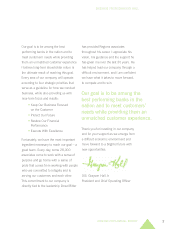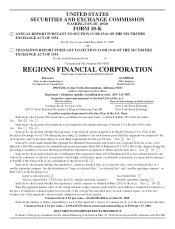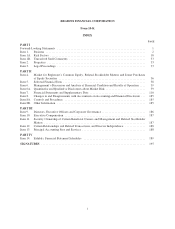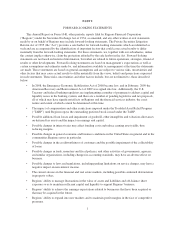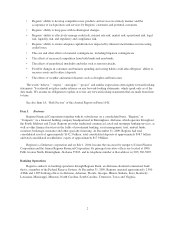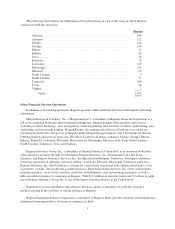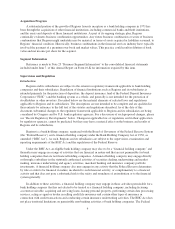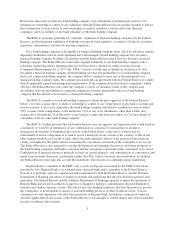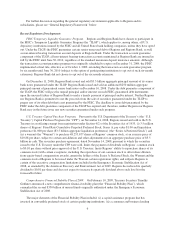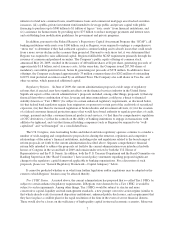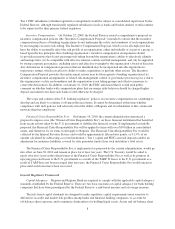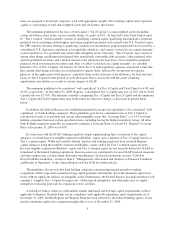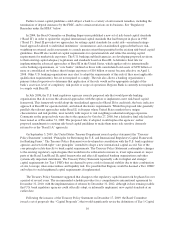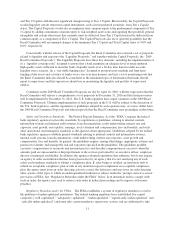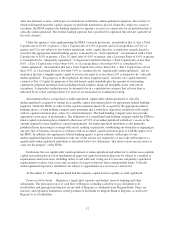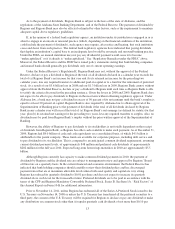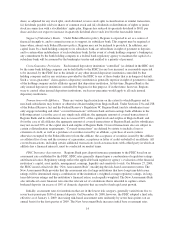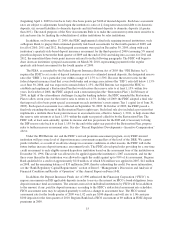Regions Bank 2009 Annual Report Download - page 19
Download and view the complete annual report
Please find page 19 of the 2009 Regions Bank annual report below. You can navigate through the pages in the report by either clicking on the pages listed below, or by using the keyword search tool below to find specific information within the annual report.Reserve has the power to order any bank holding company or its subsidiaries to terminate any activity or to
terminate its ownership or control of any subsidiary when the Federal Reserve has reasonable grounds to believe
that continuation of such activity or such ownership or control constitutes a serious risk to the financial
soundness, safety or stability of any bank subsidiary of the bank holding company.
The BHC Act provides generally for “umbrella” regulation of financial holding companies by the Federal
Reserve, and for functional regulation of banking activities by bank regulators, securities activities by securities
regulators, and insurance activities by insurance regulators.
For a bank holding company to be eligible for financial holding company status, all of its subsidiary insured
depository institutions must be well capitalized and well managed. A bank holding company may become a
financial holding company by filing a declaration with the Federal Reserve that it elects to become a financial
holding company. The Federal Reserve must deny expanded authority to any bank holding company with a
subsidiary insured depository institution that received less than a satisfactory rating on its most recent
Community Reinvestment Act of 1977 (the “CRA”) review as of the time it submits its declaration. If, after
becoming a financial holding company and undertaking activities not permissible for a bank holding company
that is not a financial holding company, the company fails to continue to meet any of the prerequisites for
financial holding company status, the company must enter into an agreement with the Federal Reserve to comply
with all applicable capital and management requirements. If the company does not return to compliance within
180 days, the Federal Reserve may order the company to divest its subsidiary banks or the company may
discontinue or divest investments in companies engaged in activities permissible only for a bank holding
company that has elected to be treated as a financial holding company.
The BHC Act requires every bank holding company to obtain the prior approval of the Federal Reserve
before: (1) it may acquire direct or indirect ownership or control of any voting shares of any bank or savings and
loan association, if after such acquisition, the bank holding company will directly or indirectly own or control
5.0% or more of the voting shares of the institution; (2) it or any of its subsidiaries, other than a bank, may
acquire all or substantially all of the assets of any bank or savings and loan association; or (3) it may merge or
consolidate with any other bank holding company.
The BHC Act further provides that the Federal Reserve may not approve any transaction that would result in
a monopoly or would be in furtherance of any combination or conspiracy to monopolize or attempt to
monopolize the business of banking in any section of the United States, or the effect of which may be
substantially to lessen competition or to tend to create a monopoly in any section of the country, or that in any
other manner would be in restraint of trade, unless the anticompetitive effects of the proposed transaction are
clearly outweighed by the public interest in meeting the convenience and needs of the community to be served.
The Federal Reserve is also required to consider the financial and managerial resources and future prospects of
the bank holding companies and banks concerned and the convenience and needs of the community to be served.
Consideration of financial resources generally focuses on capital adequacy, and consideration of convenience and
needs issues includes the parties’ performance under the CRA, both of which are discussed below. In addition,
the Federal Reserve must take into account the institutions’ effectiveness in combating money laundering.
Regions Bank is a member of the FDIC, and, as such, its deposits are insured by the FDIC to the extent
provided by law. Regions Bank is an Alabama state-chartered bank and is a member of the Federal Reserve
System. It is generally subject to supervision and examination by both the Federal Reserve and the Alabama
Department of Banking and subject to numerous statutes and regulations that affect its business activities and
operations. The Federal Reserve and the Alabama Department of Banking regularly examine the operations of
Regions Bank and are given authority to approve or disapprove mergers, consolidations, the establishment of
branches and similar corporate actions. The federal and state banking regulators also have the power to prevent
the continuance or development of unsafe or unsound banking practices or other violations of law. Various
consumer laws and regulations also affect the operations of Regions Bank. In addition, commercial banks are
affected significantly by the actions of the Federal Reserve as it attempts to control money and credit availability
in order to influence the economy.
5


